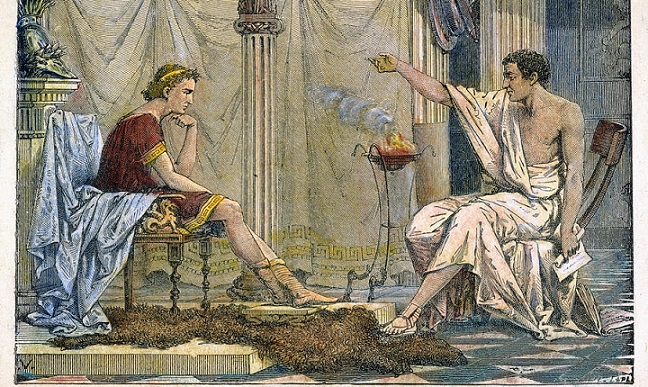by Manfred Dietrich
The world is riddled with riddles. Riddling is as old and as ubiquitous as language itself. When God invited Adam to name the beasts and the beauties of creation, he showed that each naming was an answer to the universal riddle, “What am I called?”
Much later, somewhere east of Eden, many of the prophets worked in riddles: Daniel in Babylon could read the writing on the wall, and Solomon knew of that which “scattereth yet increaseth.” Samson marked his wedding feast with a riddle for the Philistines: “Out of the eater came forth meat, and out of the strong came forth sweetness.”
Among the Greeks, Oedipus had to solve the Riddle of the Sphinx. The Birds of Aristophanes regard the lives of men as so many riddles. Aristotle sums it up: ”The very nature indeed of a riddle is this, to describe a fact in an impossible combination of words (which cannot be done with the real names of things, but can be with their metaphorical substitutes)” (Poetics, 22). He elaborates further in his Rhetoric Book III: “well-constructed riddles are attractive…because the hearer expected something different, his acquisition of the new idea impresses him all the more” (Ch 11, 1412a).
After the Greeks and Romans, we find riddles used for both entertainment and knowledge among the Norse, the Celts, the Persians, and the Anglo-Saxons, many of whom regarded riddles as sources of wisdom. In this last group is Aldhelm, the earliest English writer whose works have survived, although it is only his Latin riddles and prose that remain, some of them preserved in the Exeter Book. His vernacular verse has vanished.
Aldhelm was born circa 639 to a West Saxon royal family. He flourished in the religious community at Canterbury, England. He founded a monastery at Bradford-on-Avon, and built there the Chapel of St. Lawrence, which still stands today. About 673 he became Abbot of Malmesbury. In 705 he became the first Bishop of Sherborne. He was an avid orator. He is reported to have sung songs and riddles on the bridge to attract an audience that might come to hear his sermons in the church. Much of this singing and riddling is said to have been secular rather than religious, giving him a wide appeal. Among his notable admirers were King Alfred and the Venerable Bede. Aldhelm was canonized. His feast day, May 25 is still marked at Malmesbury.
Riddles can be playful or profound, poetic and probing, or enchanting with trickery and misdirection. Every play of words that relishes sense and sound appeals to our innermost feelings. Consider the traveller who meets two men in a forest. One is bound to speak only truth, but his brother always lies. The traveller asks the first man, “which one are you?” The first man replies “my brother will tell you he is the truthful one.” Layers of truth and deception unfold in an interesting way here. If the first brother is the liar, then the second brother must in fact say the opposite of what his brother predicts he would say. That, of course, is impossible since he must be the truthful brother if the first brother is the liar. Conversely, if the first brother is truthful, and the second brother is the liar, then of course the first brother will say truthfully that his liar brother will claim to be the truthful one.
Sure, it is stimulating to the mind (fun) to figure out these possibilities, but it also tells us something about the way words and the mind work. The second brother, who is the liar, draws attention to himself and becomes the center of focus, as lies and bad behavior often do in reality. Truth, however, ultimately reigns, as in all riddles.
Manfred Dietrich is a senior, semi-retired from a business career, living in Hamilton, Canada. He received degrees in English Literature in the 1970s, whereupon he went to England as a Commonwealth Scholar and a Canada Council for the Arts scholar to pursue doctoral research on the poetry of Matthew Arnold.
















What an interesting and enjoyable read, Manfred Dietrich! Thank you for sharing this brief history with us.
Delightful essay, Mr. Deitrich, and thank you for resisting the temptation to reference the ______ _______ between _____ _______ and ______ in _. _. _____’ “___ ______.”
. . . not to mention Batman’s nemesis.
If the second brother told the traveler nothing, and remained silent, that would give the lie to the first brother.
So many nemeses to choose from. The Joker? So many of those to choose from, too.
The parable was a good showstopper. Champagne during intermission?
Batman’s (and numerous others) nemesis was The Riddler.
Given that the above (most informative) essay contained so many names of humans who’ve been associated with the word Riddle; I just felt it wouldn’t be incongruous to chuck-in another (albeit fictional) individual from the past.
Indeed: if one were able to ask the Riddler himself for his view on the matter . . he might proclaim that he has – by dint of his very name – the greatest claim to be associated with the history of Riddles.
I liked Manfred’s timely contribution myself. It seemed exactly the right thing at exactly the right moment.
As to the assurance of truth’s ultimate triumph, I was reminded of a favorite Terence apothegm: Veritas odium parit. Truth certainly has often been suppressed.
But truth will out they say, and I’m all for that being true.
I am not sure the riddle of existence has been solved yet.
Wonderful story….